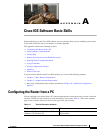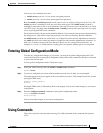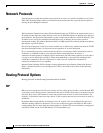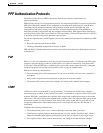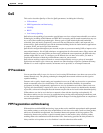
B-1
Cisco Secure Router 520 Series Software Configuration Guide
OL-14210-01
APPENDIX
B
Concepts
This appendix contains conceptual information that may be useful to Internet service providers or
network administrators when they configure Cisco routers. To review some typical network scenarios,
see
Chapter 2, “Sample Network Deployments.” For information on additional details or configuration
topics, see Chapter 10, “Additional Configuration Options.”
The following topics are included in this appendix:
• ADSL
• Network Protocols
• Routing Protocol Options
• PPP Authentication Protocols
• TACACS+
• Network Interfaces
• NAT
• Easy IP (Phase 1)
• Easy IP (Phase 2)
• QoS
• Access Lists
ADSL
ADSL is a technology that allows both data and voice to be transmitted over the same line. It is a
packet-based network technology that allows high-speed transmission over twisted-pair copper wire on
the local loop (“last mile”) between a network service provider (NSP) central office and the customer
site, or on local loops created within either a building or a campus.
The benefit of ADSL over a serial or dialup line is that it is always on and always connected, increasing
bandwidth and lowering the costs compared with a dialup or leased line. ADSL technology is
asymmetric in that it allows more bandwidth from an NSP central office to the customer site than from
the customer site to the central office. This asymmetry, combined with always-on access (which
eliminates call setup), makes ADSL ideal for Internet and intranet surfing, video on demand, and remote
LAN access.



